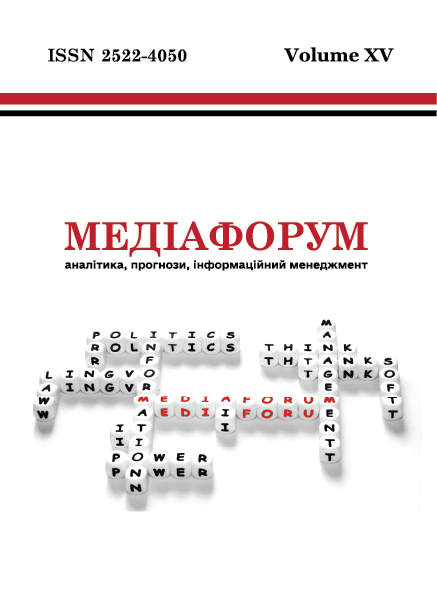The European Security Crisis and the Position of the United States in Late 2021 – Early 2022
DOI:
https://doi.org/10.31861/mediaforum.2024.15.77-94Keywords:
security crisis, Russian invasion, deterrence strategy, economic sanctions, military assistance, spheres of influenceAbstract
The article analyses the position of the J. Biden administration on the security crisis in Europe that arose at the end of 2021 as a result of Russia's aggressive actions around Ukraine's borders. This security crisis was objective in nature, caused by the Kremlin's changing approach to the Ukrainian issue and its desire to increase its geopolitical influence in the region. It has been found that in response to Moscow's military preparations, the Biden administration has developed and implemented a comprehensive package of deterrence measures, focusing on the diplomatic resolution of contradictions with Russia.
The US anti-crisis management strategy included diplomatic pressure, disclosure of some intelligence on the Kremlin's military plans, strengthening the military presence in Europe, especially Eastern Europe, developing a package of economic sanctions against Russia in case of an invasion, and providing Kyiv with additional military assistance. At the same time, the indecision and caution of the Biden administration and the public definition of 'red lines' undermined the effectiveness of the US strategy, as they were perceived as weakness by the Russian leadership and only fuelled the Kremlin's aggressive intentions and confidence in its victory over Ukraine.
Based on pessimistic forecasts by US intelligence agencies, senior US administration officials were preparing for imminent defeat and occupation of Ukraine. The main objectives of the Biden administration's strategy in this crisis were to strengthen the defence of NATO's eastern flank and to prevent the war from spreading beyond Ukrainian territory.
Downloads
References
Buriachenko, O. V. 2023. Rosiisko-ukrainska viina yak faktor porushennia ta evoliutsii svitovoi bezpekovoi rivnovahy. Politykus, 2: 73-83.
Vystup V. Zelenskoho na Miunkhenskii konferentsii 19.02.2022 r.: povnyi tekst. Slovo i dilo: https://www.slovoidilo.ua/2022/02/19/novyna/polityka/vystup-zelenskoho-myunxenskij-konferencziyi-povnyj-tekst (accessed October 16, 2023).
Vidnianskyi, S., ta Martynov, A. 2023. Rosiisko-ukrainska viina ta mizhnarodne spivtovarystvo: monohrafiia. K.: Instytut istorii Ukrainy NAN.
Hryshchenko, T., ta Dobryi-Vechir, I. 2023. Pohliady amerykanskoho politykumu na rosiisko-ukrainski vidnosyny naprykintsi 2021 – 23.02.2022. Visnyk KNU imeni T. Shevchenka. Istoriia 2 (157): 5-12.
Derzhavnyi sekretar SShA rozpoviv, pro shcho Shtaty hotovi domovliatysia z RF. 2022. Ukrainska pravda. 9 sichnia 2022 r. URL: https://www.pravda.com.ua/news/2022/01/9/7319831/(accessed October 11, 2023).
Dzhonson rozpoviv, yak krainy YeS reahuvaly na perspektyvu vtorhnennia Rosii v Ukrainu. Glavcom.ua. 23 lystopada 2022 r. URL: https://glavcom.ua/world/world-politics/frantsija-do-ostannoho-ne-virila-dzhonson-rozpoviv-jak-jes-vidreahuvav-na-vtorhnennja-rf-890924.html (accessed October 11, 2023).
Klymovets, V., ta Martynchuk, I. 2023. Pozytsiia SShA shchodo rosiisko-ukrainskoi viiny v 2014-2022 rr. Aktualni problemy vitchyznianoi ta vsesvitnoi istorii 35: 128-136.
Lossovskyi, I. Ye. 2018. Zovnishnopolitychna stratehiia rosii shchodo krain postradianskoho prostoru yak realizatsiia «novoi doktryny obmezhenoho suverenitetu». Stratehichna panorama 2: 19-30.
Morenchuk, A., ta Kolesnychenko, N. 2023. Mizhnarodni naslidky vyvedennia amerykanskykh viisk z Afhanistanu. Mizhnarodni vidnosyny, suspilni komunikatsii ta rehionalni studii 1(15): 31-44.
D’Anieri, P., and Hurak, I. 2022. The Evolution of Russian Political Tactics in Ukraine. Problems of Post-Communism 69 (2): 121-132.
Götz, E, and Staun, J. 2022. Why Russia attacked Ukraine: Strategic culture and radicalized narratives. Contemporary Security Policy 43 (3): 482-497.
Kanet, R. E. 2021. The Russian Federation, the USA and European security. International Politics 58: 235-258.
Lanoszka, A., and Becker, J. 2023. The art of partial commitment: the politics of military assistance to Ukraine. Post-Soviet Affairs 39 (3): 173-194.
Road to war: U.S. struggled to convince allies, and Zelensky, of risk of invasion. The Washington Post. 16.08. 2022. URL: https://www.washingtonpost.com/national-security/interactive/2022/ukraine-road-to-war/ (accessed October 16, 2023).














